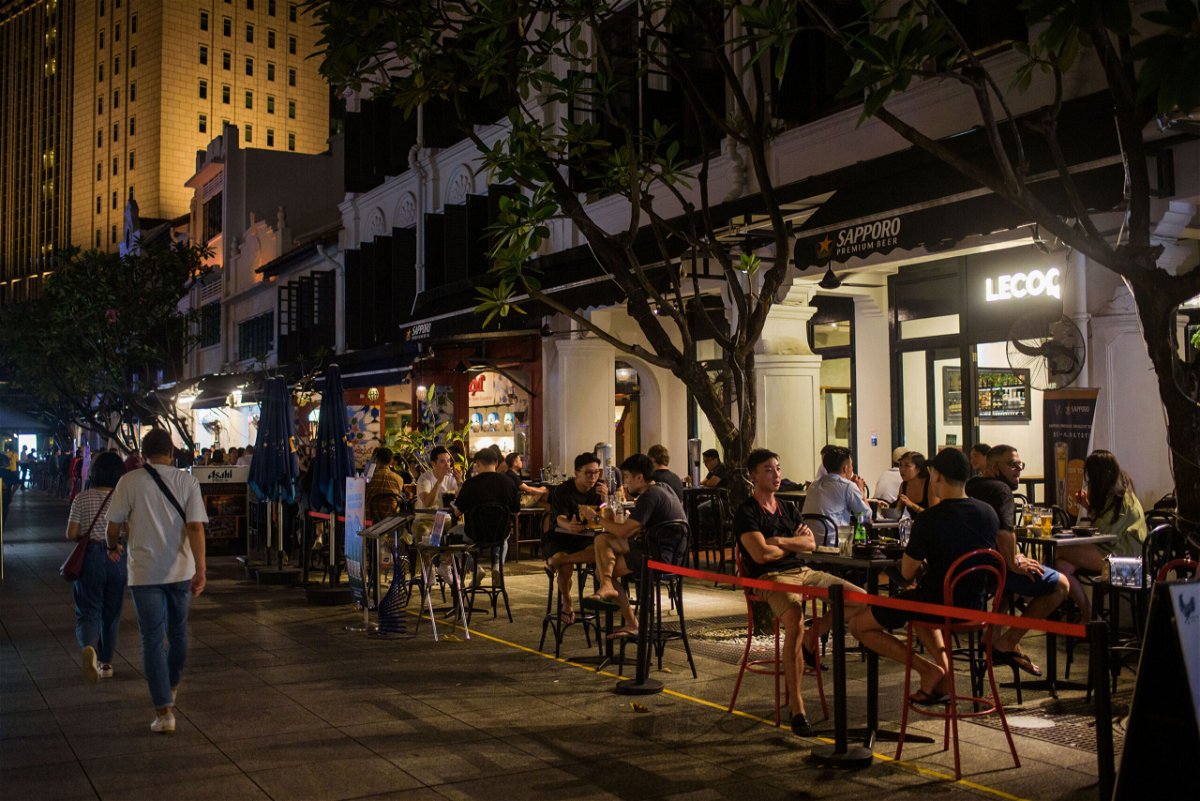Singapore prepares to rock softly as Covid music ban partially relaxed

Singapore is lifting its controversial ban on music in restaurants and bars as part of an easing of coronavirus restrictions. People are shown here at tables in groups of two as mandated by Covid-19 safety restrictions drink at bars in Singapore on October 23
By Rhea Mogul, CNN
Singapore is lifting its controversial ban on music in restaurants and bars as part of an easing of coronavirus restrictions — but authorities have warned business owners they must still keep the noise down.
From Wednesday, food and beverage establishments can play “soft recorded music,” Finance Minister Lawrence Wong said at a news conference Monday. The ban, in place since June 18, was based on the rationale that loud or heavy background noise encourages people to speak louder — increasing the risk of spreading Covid-19. Live music will remain banned.
The rule had been met with criticism, especially from some in the Southeast Asian city-state’s catering industry, which said it could hurt business.
The change marks a relaxation of curbs that were reimposed in September, as Singapore — which has one of the highest vaccination rates in the world — battled a surge in infections fueled by the highly contagious Delta variant.
Singapore has vaccinated more than 82% of its 5.45 million population, according to data from Johns Hopkins University. While it is still recording around 3,000 cases per day, most are asymptomatic or mild.
According to the government, its Covid-19 expert committee is expected to make a recommendation later this month on use of the Pfizer-BioNTech vaccine for children ages 5 to 11, while about 50% of Singapore’s population would have received booster shots by the end of the year.
Under the eased restrictions, up to five fully vaccinated people from the same household will be allowed to dine together at restaurants and bars — an increase from two, Trade Minister Gan Kim Yong said at the news conference Monday.
“With the situation stabilizing, we are now in a better position to ease some of the safe management efforts, without overwhelming our health care system,” he said.
Singapore will also allow quarantine-free travel for vaccinated people from neighboring Malaysia, as well as Sweden and Finland, authorities said, bringing the total number of countries it has quarantine-free arrangements with to 16.
Jeremy Lim, associate professor at the Saw Swee Hock School of Public Health, National University of Singapore (NUS), said the lifting of restrictions is “important to resuscitate a devastated food and beverage sector.”
“The detail of the restrictions really reflects the penchant of the Singapore policy makers for precision and desire to control every factor possible,” he said.
Second easing of restrictions
When the pandemic began, Singapore pursued an aggressive “zero-Covid” policy, shutting its borders while imposing tight restrictions and social distancing rules. But in June, the government said it was planning to move toward a living with Covid strategy — attempting to control outbreaks with vaccines and monitoring hospitalizations rather than restricting lives.
In August, Singapore started to relax some restrictions, allowing fully vaccinated people to dine in restaurants and gather in groups of five, up from two. Workers gradually also resumed going to the office.
But September’s Delta outbreak put an end to those freedoms. Several curbs were reimplemented, including a return to the strict two-person rule.
Now, citing the high vaccination rate and stabilization of new cases, authorities are gradually lifting restrictions again, saying Singapore must do more to restore its connectivity with the world.
Lim, from NUS, said Singapore has strengthened health facilities for future Covid surges, which could be one reason authorities are easing controls.
“The world is opening up and Singapore is an obvious outlier based on vaccination rates versus restrictions,” he said. “Politically it’s just much harder to justify the ongoing restrictions relative to other countries, especially since more and more quarantine-free travel is permitted.”
He also pointed to restriction “fatigue” among Singapore residents.
“Public sympathy for those unvaccinated by choice is wearing thin, thus allowing for relaxing of measures despite the increased risk to the unvaccinated,” Lim said.
Elsewhere in Asia
Singapore’s “living with Covid” model reflects the strategy of several other Asian countries that are working toward treating the virus as endemic. Countries including Thailand, Vietnam, and Malaysia are looking to revive their economies via tourism and reopening businesses.
Even India — which battled a devastating second wave of infections — opened to some vaccinated foreign tourists on October 15, as it continues with its aggressive vaccination drive.
But one of Asia’s biggest financial centers is absent from this growing list.
Hong Kong closed its borders to non-residents at the start of the pandemic. It recently reopened to some foreign visitors, but it imposes tough quarantine of up to 21 days in a hotel for arrivals from countries its government deems high-risk, including the United States and the United Kingdom.
The measures have been heavily criticized by business groups, which warn they threaten the Chinese territory’s position as an international financial hub. Hong Kong leader Carrie Lam has repeatedly said the city will prioritize reopening its borders with mainland China over the rest of the world.
The-CNN-Wire
™ & © 2021 Cable News Network, Inc., a WarnerMedia Company. All rights reserved.